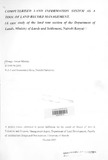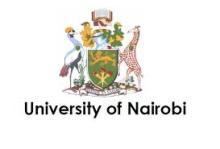Resource information
This project thesis presents a conceptual framework for a land information system that
would result in increased revenue collection from the land rent section of the Department
of Lands, Ministry of Lands and Settlement. It point out the need for a comprehensive
database containing both physical and socio-economic data supported by powerful
analytical capabilities as the basis for effective decision making on land rent for tax
revenue collection.
The Government has admittedly a lot of untapped revenue in the form of unrevised land
rents and land rent defaulters. The land rent section however is crippled by the manual
system of record keeping in all its departments ,and lack of policy instruments for
effective management of information. Information obtained from the land rent section
reveals that there's an outstanding arrears in land rent to the tune of Kenya Shilling
4,8.00,000,000 (Four Billion, Eight Million Shillings) or US$ 60,000,000 (Forty eight
million dollars). Land rent ,has not been taken seriously by many leaseholders due to the
Government's laxity in revising and collecting it.
The researcher has identified the type and nature of problems of land rent determination,
record management and collection. A conceptual model showing the components of a
computerized land information system has been analyzed and potential benefits and
possible solutions to the problems outlined using selected properties from the Nairobi hill
area. The possibilities of using land information as a corporate resource have also been
explored.
To achieve the above objectives, the researcher conducted oral interviews with personnel
from the land rent section and other departments that influence the determination of land
rent like the valuers and land officers. Several leaseholders were interviewed with the
view of determining the level of awareness of the need to pay land rent. The model for a
computerized land information system was then developed using a digitized map of the
selected area of study and available socio-economic data on these properties. The level of awareness of the need to pay land rent was analysed usmg statistical
methods of data analysis. Capabilities of the computerised land information system were
then analysed and the findings compared to the current manual system of record
collection to draw results. Possible solutions to the p~dentified in using the
manual system have also been addressed.
The researcher recommends after analysis of the findings that there be a general rent
review for all leasehold properties within the country using computer aided valuation
methods with an emphasis on Multiple Regression Analysis. There is need to educate
leaseholders on the importance of prompt payment of land rent. Automation of land rent
records is the viable solution to the multiplicity of preblems currently faced by the
section as regards retrieval of information and management of land rent records. All these
recommendations can only be implemented where there is a sound policy framework on
land information management. The land information system generated would be
beneficial to other government ministries and other departments within the ministry of
land. There is therefore need to consider the use of the land information as a corporate
resource.


